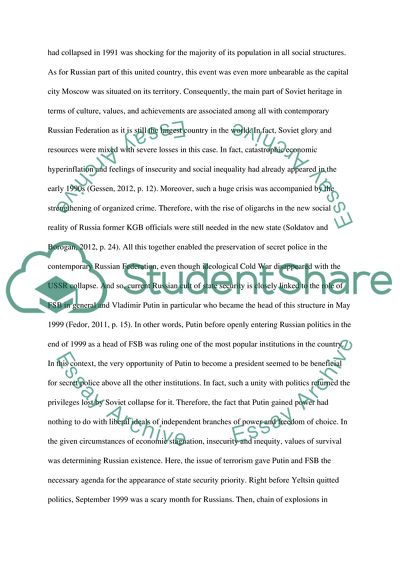Cite this document
(Rise of Putin's Dominant Position in Russian Politics Essay Example | Topics and Well Written Essays - 1750 words, n.d.)
Rise of Putin's Dominant Position in Russian Politics Essay Example | Topics and Well Written Essays - 1750 words. https://studentshare.org/politics/1844468-how-would-you-explain-the-rise-of-vladimir-putin-and-the-dominant-position-he-has-occupied-in-russian-politics-since-1999-how-secure-is-this-position-today
Rise of Putin's Dominant Position in Russian Politics Essay Example | Topics and Well Written Essays - 1750 words. https://studentshare.org/politics/1844468-how-would-you-explain-the-rise-of-vladimir-putin-and-the-dominant-position-he-has-occupied-in-russian-politics-since-1999-how-secure-is-this-position-today
(Rise of Putin'S Dominant Position in Russian Politics Essay Example | Topics and Well Written Essays - 1750 Words)
Rise of Putin'S Dominant Position in Russian Politics Essay Example | Topics and Well Written Essays - 1750 Words. https://studentshare.org/politics/1844468-how-would-you-explain-the-rise-of-vladimir-putin-and-the-dominant-position-he-has-occupied-in-russian-politics-since-1999-how-secure-is-this-position-today.
Rise of Putin'S Dominant Position in Russian Politics Essay Example | Topics and Well Written Essays - 1750 Words. https://studentshare.org/politics/1844468-how-would-you-explain-the-rise-of-vladimir-putin-and-the-dominant-position-he-has-occupied-in-russian-politics-since-1999-how-secure-is-this-position-today.
“Rise of Putin'S Dominant Position in Russian Politics Essay Example | Topics and Well Written Essays - 1750 Words”. https://studentshare.org/politics/1844468-how-would-you-explain-the-rise-of-vladimir-putin-and-the-dominant-position-he-has-occupied-in-russian-politics-since-1999-how-secure-is-this-position-today.


